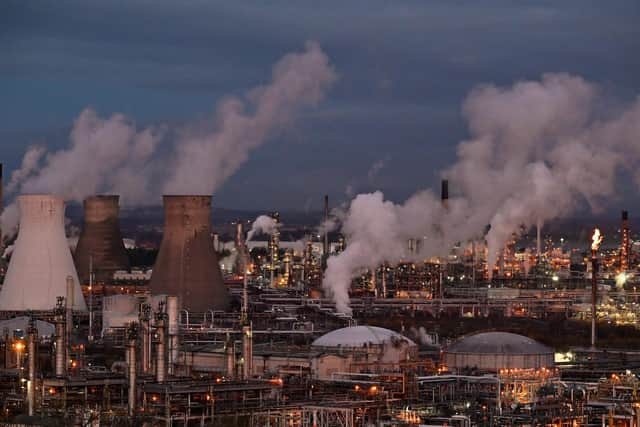Climate change: Grangemouth oil refinery closure is bad for workers and a blow for Scotland’s economy – but is there an upside?
The Petroineos plant in Grangemouth – a joint venture between Beijing state energy firm PetroChina and Sir Jim Ratcliffe’s Ineos – is one of Scotland’s single biggest climate polluters, generating more than one million tonnes of greenhouse gas emissions in 2022.
So its loss will wipe out a huge share of the country’s balance sheet, which sits at around 41 million tonnes a year.
Advertisement
Hide AdAdvertisement
Hide AdHowever, the closure has sparked anger among environmentalists.
There is sympathy for the hundreds of workers who are set to lose their jobs as refining operations cease and the site becomes an import and distribution base for fuels – expected in spring 2025.
There is also criticism of government and company bosses, with accusations that warnings were ignored and nothing was done to safeguard jobs in the shift away from fossil fuels.
“Workers at the refinery and the wider community at Grangemouth deserve better,” said Rosie Hampton, just transition campaigner with Friends of the Earth Scotland.
“Escalating climate breakdown and the phase-out of fossil-fuelled vehicles means that the transition away from oil and gas is essential in the coming years.


“Today’s announcement is, sadly, the inevitable consequence of the Scottish Government’s repeated failure to grasp this reality and to put concrete transition plans in place with workers.”
She called for the Scottish Government to “act quickly” to develop a “meaningful plan” with workers and communities at its heart.
She hit out at Ineos chief Mr Radcliffe, the UK’s second richest person with an estimated fortune nearing £30 billion.
Advertisement
Hide AdAdvertisement
Hide AdShe described the billionaire, who recently bought Manchester United football club, and his firm as “an irresponsible owner who care little for their workers”.
Scottish Greens MSP Gillian Mackay said the “climate-wrecking business giant” had “abandoned” its workers and the local community.
“Make no mistake, we must move away from fossil fuels,” she said.
“But this is the exact opposite of a just transition.
“This is not a staged change towards a more sustainable way of working.”
She added: “It has all the hallmarks of a business that, having squeezed what it can out of its workforce, knows it is running out of road and is looking to cut and run – and to hell with the consequences.”
The Petroineos refinery contributed 1,019,780 tonnes of carbon dioxide equivalent last year.
Only SSE’s gas power station in Peterhead was responsible for a greater share, generating 1,353,360 tonnes.
The refinery is just one of five facilities owned by Ineos at Grangemouth, including a chemical plant, which together produce more than double the emissions created at Peterhead.
Advertisement
Hide AdAdvertisement
Hide AdBut climate campaigners warn that without cutting fossil fuel usage, emissions once generated at the Petroineos plant will merely be “offshored” to another location.
Caroline Rance, from Friends of the Earth Scotland, said: “The Grangemouth refinery has been a mega-polluter in terms of Scotland's climate emissions, so a coherent transition plan has long been needed for the site.
“Whilst the decision to stop refining at Grangemouth and shift to being an import-export hub may change where the emissions from refining will be created, it doesn’t affect its global climate impact if we consume the same amount of oil and gas products.
“The Scottish Government still has a responsibility to reduce demand for oil and gas, which requires concerted political action – from changing the way we travel to decarbonising our homes.”
Comments
Want to join the conversation? Please or to comment on this article.